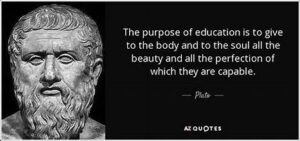
In the fast-paced, ever-evolving landscape of the modern world, it’s easy to overlook the timeless wisdom of ancient philosophers. Among them, Plato, the renowned Greek philosopher, stands out for his profound insights into human nature, society, and personal development. His teachings, though originating over two millennia ago, offer valuable lessons that remain relevant in today’s world. This article explores how Plato’s wisdom can guide us towards personal and professional success.
1. The Pursuit of Virtue
One of Plato’s core teachings revolves around the pursuit of virtue. In his dialogues, Plato often emphasized that the ultimate goal of human life is to achieve virtue, which he defined as a form of moral excellence. For Plato, virtue is not just a personal trait but a foundational element for a just society.
Applying Plato’s Virtue to Personal Success:
- Self-Discipline: Embracing self-discipline helps individuals stay focused on their goals and resist distractions. By developing self-discipline, one can achieve greater personal and professional success.
- Integrity: Upholding integrity in all actions and decisions builds trust and respect, essential for lasting relationships and career advancement.
2. The Theory of Forms
Plato’s Theory of Forms posits that the physical world is a mere reflection of a higher realm of abstract, ideal forms. According to Plato, true knowledge and understanding come from grasping these ideal forms, which are eternal and unchanging.
Applying the Theory of Forms to Professional Success:
- Pursue Excellence: Strive for excellence by setting high standards and continuously improving your skills and knowledge. Aim to understand the essence of your work rather than just its superficial aspects.
- Innovate and Create: Use your understanding of the ideal to innovate and create solutions that go beyond the status quo. This mindset can lead to breakthroughs and career advancements.
3. The Role of Education
Plato placed great emphasis on education as a means to achieve wisdom and personal growth. He believed that education should not only impart knowledge but also cultivate the soul and character.
Applying Plato’s Views on Education:
- Lifelong Learning: Commit to continuous learning and personal development. In a rapidly changing world, staying updated with new knowledge and skills is crucial for career growth.
- Mentorship: Seek out mentors and advisors who can provide guidance and share their wisdom. Similarly, be willing to mentor others and contribute to their development.
4. The Importance of Rational Thought
In “The Republic,” Plato discusses the importance of rational thought and reason in achieving justice and harmony. He argues that individuals should use reason to govern their actions and decisions.
Applying Rational Thought to Success:
- Decision-Making: Make informed decisions by evaluating all available information and considering potential outcomes. Rational thought leads to better judgment and problem-solving.
- Conflict Resolution: Use reason to address conflicts and find mutually beneficial solutions. Rational approaches help maintain professional relationships and foster collaboration.
5. The Allegory of the Cave
Plato’s Allegory of the Cave illustrates the process of enlightenment and the journey from ignorance to knowledge. In this allegory, prisoners in a cave perceive only shadows on the wall and believe them to be reality until one prisoner escapes and discovers the true world outside.
Applying the Allegory of the Cave to Personal Growth:
- Challenge Assumptions: Question existing beliefs and perspectives. Be open to new ideas and experiences that can broaden your understanding and lead to personal growth.
- Seek Knowledge: Actively seek out new knowledge and experiences that can enhance your professional skills and personal development.
Conclusion
Plato’s timeless wisdom offers valuable insights for navigating the complexities of today’s world. By embracing the pursuit of virtue, understanding the Theory of Forms, valuing education, prioritizing rational thought, and challenging assumptions, individuals can achieve personal and professional success. Plato’s teachings remind us that true success is not merely about achieving material gains but about cultivating a life of excellence, integrity, and continuous growth.

